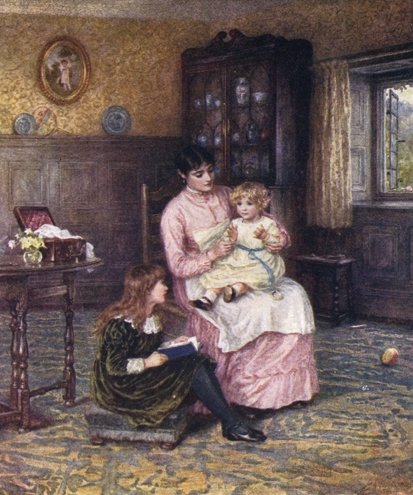Soon after moving to London at the age of 20, Nina Stibbe wrote to her sister Vic saying, ‘Being a nanny is great. Not like a job really, just like living in someone else’s life.’ She was working for Mary-Kay Wilmers, the editor of the London Review of Books, and her letters home to Lincolnshire give a hilarious picture of her new life. She gets on well with her charges, Sam (ten) and Will (nine), treating them as equals and often playing tricks on them:
Sam was invited to supper at the Tomalins’ — his first ever (official, evening) meal. Told him that Claire had rung to ask him to bring a potato with him. Will and me thought it was hilarious when Sam set off with a potato in one hand and his football cards in the other.
Alan Bennett comes to dinner most nights, despite some rather dodgy cooking:
Seeing such a lot of my Florida coleslaw left in the bowl, AB made one of his usual food pronouncements: ‘You’d be better off with mayonnaise or yoghurt, and perhaps not the tinned oranges.’
Much of the book is made up of entertaining snatches of conversation, which always seem to conjure up something essential about the people who are talking:
Nunney [Nina’s friend and now husband]: What are you doing?
Me: Cutting out shapes, it’s Will’s homework.
Nunney: (cross) Why isn’t Will doing it?
Me: He doesn’t like paper craft and he’s writing a novel.
Nunney: Cutting out paper to exact measurements is maths… Will should do it — it’s a life skill.
Will: I’ll never need to measure paper in real life; I’ll buy it already measured.
Nunney: (to Will) Don’t let her ruin your life.
Will: She’s helping me with my novel.
Now and then Nina’s friends turn up with silly hairstyles and odd requests. One asks Alan Bennett for acting tips: ‘It was strange having Amanda in the kitchen ripping the flower and shouting at me in an American accent and AB sipping his camomile tea.’ Mary-Kay Wilmers often comes home to scenes like this and seems wryly amused by her nanny, putting up cheerfully with quite a lot of lying and small-time theft. You can see why; there’s something irresistible about Nina’s wide-eyed naughtiness.
From Katherine Holden’s history of nannies it’s clear that Stibbe would not have been cut out for the monastic life of a nanny in another age. Professional nannies signed up to a life of unrelenting hard work, starching and stitching and parading with prams. There’s a powerful dramatic tension in a child’s utter dependence on an employee. Holden records examples of deep affection and lasting relationships, as well as of incomprehensible cruelty. One nanny nearly starved a two-year-old to death, one murdered her charge with arsenic, another did away with hers by throwing it into a cauldron of boiling water.
Unfortunately, Nanny Knows Best is written as if for an examiner; topics are covered dutifully and examples are thrown in to back up arguments, rather than for their own merit. Holden keeps readers abreast of what she is doing with sentences like: ‘Following these debates over time…is fascinating because we can see which aspects altered and which stayed the same.’ She has spent a lot of time interviewing old people — sometimes she mentions the tears of an old man remembering his nanny, or the loneliness of an abandoned old nanny. You get the sense that there was more in their tears than Holden has allowed herself to explore in this academic study.
As for Secrets of a Pet Nanny, publishers know they’re on to a winner if they put out a book about dogs just before Christmas, and it’s a dirty trick to play on Britain’s innocent dog-lovers. This one is a series of rapid accounts of what it was like having Jessie, Buster, Scrumpy etc to stay. One dog goes missing for an hour or so, another chews an antique rug, a few more pee on the sofa and have strange eating habits. The eccentricities of a beloved dog are one thing in real life and quite another on the page. Brian Sewell seems to have pulled it off, but this lot aren’t quite unusual enough to hold their own, despite the endless puppy-like enthusiasm of their nanny.






Comments